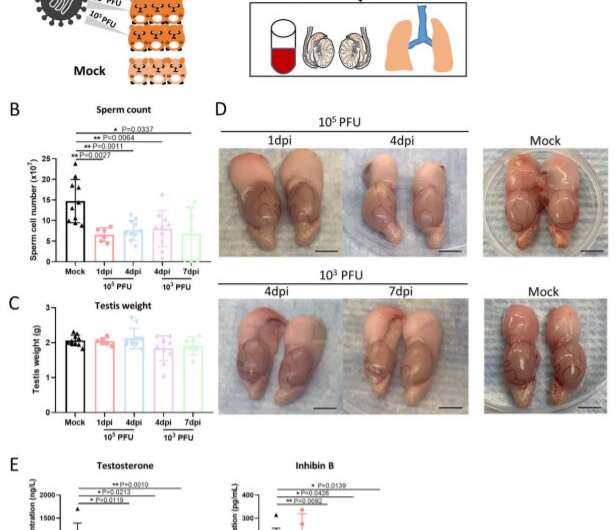
Researchers at the Department of Microbiology of The University of Hong Kong (HKU) have found that the COVID19 virus can cause acute testicular damage, chronic asymmetric testicular atrophy, and hormonal changes in hamsters despite a light pneumonia.
“In managing convalescent COVID-19 males, it is important to be aware of possible hypogonadism (low sex drive) and subfertility,” said Chair of Infectious Diseases Professor Kwok-yung Yuen, who led the research effort. “COVID-19 vaccination can prevent this complication.” The study has been accepted for publication in the journal Clinical Infectious Diseases.
Previous studies have reported testicular pain in COVID-19 patients. One autopsy study of males who died from COVID-19 showed orchitis with lots of testicular cell damage, but SARS -CoV-2 was not consistently found in semen specimens.
The HKU team investigated the testicular and hormonal changes of hamsters infected by virus given through the intranasal or direct testicular route using the influenza virus in the control group. THe research finds that virus-infected hamsters developed self-limiting pneumonia. But even intranasal SARS-CoV-2 challenge caused acute decrease in sperm count, and serum testosterone starting from the four to seven days. The SARS-CoV-2 infected hamsters developed testicular atrophy with reduced testicular size and weight. The serum sex hormone level was markedly reduced at 42 to 120 days after infection (dpi). Acute testicular inflammation, hemorrhage, and necrosis of seminiferous tubules and disruption of spermatogenesis were seen.
From 7 to 120 dpi, the inflammation, degeneration and necrosis of testicular tissue persisted. Intranasal challenge with omicron and delta variants were found to induce similar testicular changes. These testicular damages can be prevented by vaccination.
Source: Read Full Article